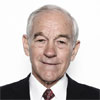The Event that Launched My Political Career
On August 15, 1971, I was listening to the TV, and Nixon made the announcement about closing the gold window and imposing wage and price controls and a tariff, which economically, I thought this was just horrendous and astounding.
We couldn’t honor our commitment to the foreign holders of dollars. So I thought this was very big. Yet at that time, the immediate reaction was euphoria.
If the business community can respond in glee over this announcement that we’re literally bankrupt, we’re going to default; then we’re in worse shape than I thought.
So, it became evident that the country was oblivious to the importance of money and the Federal Reserve, I thought: well, what the heck, I’m gonna talk about it because it sounded to me like an interesting subject. Not that I want a political career, because I had a good medical practice.
It was that time when my wife warned me about the danger of this adventure that I was on. She said it was dangerous. I said: why’s that? And she said: well, you could end up getting elected. And I said: no way. For my speeches and what I’m going to promise, that’s not the way you get elected to Congress or anything, because the money was the issue for me.
And of course, anybody who was in politics said: hey, you don’t do this; nobody knows what you’re talking about. The political people were just sort of totally annoyed about what I wanted to talk about, as they continue to be.
But, I saw 1971 as the conversion of a token commodity money to an absolute political money. It went from a loose linkage to gold, which provided some benefits but not a whole lot; it was destined to fail. Versus total political money, which is totally fiat money which is created by the Federal Reserve.
But once the linkage was broken, then you had totally political money which would guarantee that the spenders would benefit by this because the people in Congress wouldn’t have to really worry.
Taxes are limited, and borrowing can be limited. But once you have the Fed involved, this invites spending. And in many ways, it was quite accurate to predict then that eventually we would have a debt problem. And it has led to this. But the market eventually limits that. So no matter how political it is and how strong the Fed is, and how powerful the Congress is; economic laws are very powerful, too. And it was the economic law that caused Bretton Woods to fail.
So it’s economic laws that have brought this crisis. You can’t have bubbles forever. You can’t expect housing prices to go up constantly and keep building and building. Eventually, you hit a brick wall and you have to have your correction.


Comments: